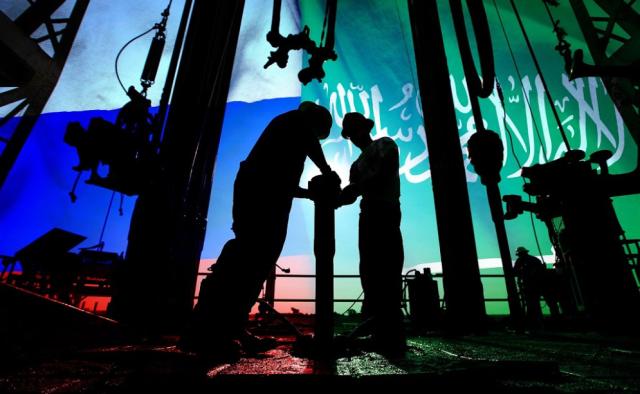
(Source: Hart Energy; Shutterstock.com)
With neither Saudi Arabia nor Russia appearing willing to back down, the newly declared price war could drag to very low levels for a very long time, an RS Energy Group expert said during a March 12 webinar.
Bill Farren-Price, London-based director of international energy policy and geopolitical research, said it is highly likely “Russia may never return to any sort of supportive and cooperative role with OPEC,” adding that he doesn’t see the price war ending anytime soon. “It may be possible that Saudi Arabia and its Gulf allies are buckling in for periods of oil prices as low as $20 Brent for the next six to nine months.”
Global oil markets spiraled downward last week following the collapse of production negotiations. The damage continued on March 16, with Brent diving a further 11% to just above $30 per barrel (bbl) and WTI falling to about $29/bbl by mid-morning.
Saudi Arabia had proposed deeper production cuts of 1.5 million bbl/d in response to the slump in demand due to the coronavirus outbreak. Russia not only rejected the proposal on March 6, but also announced it will no longer abide by the previous cuts.
The price war gained momentum when state-owned Saudi Aramco slashed its crude oil prices and announced it would boost production to 12.3 million bbl/d in April, well above the 9.7 million bbl/d it had maintained, and a production level never achieved before. Amin Nasser, the company’s CEO, then announced plans to ultimately boost its output capacity to 13 million bbl/d, a task that could take several years.
“This is a clear demonstration that the Saudis are absolutely committed to project their power in the oil markets and they are not going to back off from this,” said Farren-Price during the joint webinar with Enverus, which acquired RS Energy last month.
OPEC’s third-largest producer, the United Arab Emirates, joined the price war on March 11. State-owned Abu Dhabi National Oil Co. said it would increase production to 4 million bbl/d by April from its current 3 million bbl/d.
How Long Will The Price War Last?
Saudi Arabia’s aggressive stance was startling because it is in stark contrast to its historically consensus approach to production cuts, Farren-Price said. OPEC has tended to cut production to shore up prices during periods of oversupply.
And that’s what the Saudis wanted—until things fell apart.
“What’s interesting is during the OPEC meeting, [Saudi leaders] had hitched themselves to Russian cooperation for price cuts. It’s also interesting to note that there has been a strong intervention of Saudi leadership from Crown Prince Muhammad bin Salman, who has been overly involved in some of the decisions,” Farren-Price said.
He called Saudi Arabia’s policy “strong and high-risk” because ultimately the country will need much higher oil prices to sustain budgets. Although Saudi Arabia has been pushing efforts to diversify its oil-centric economy during the past few years, lower oil prices will impact the country’s stability.
Reuters reported on March 16 that an OPEC and non-OPEC technical meeting, scheduled March 18 in Vienna to resolve the dispute between Saudi Arabia and Russia, has been called off.
Sustainable Production Levels
Several industry experts agree that the Russian move was directly targeted at the U.S. shale oil industry, which will bear the brunt of the price war. The Russians have been “threatened” by the U.S. shale revolution and its liquid supply taking over some of their key markets, both in Europe and Asia, Farren-Price explained.
RELATED:
Few US Shale Producers Can Withstand Prolonged Oil Price War, Analysts Say
However, Russian companies can ensure sustainable production until oil hits $15 to $20 per barrel, according to some analysts—which can largely be attributed to Russia’s $570 billion in reserves, a floating exchange rate and an economy that relies far less on foreign capital and imports than it did just a few years ago.
As OPEC’s most flexible producer, the Saudis aren’t in a bad shape either. April will be an interesting month for Saudi Arabia in trying to achieve its production target, Farren-Price noted. “I think a fair amount of it will come from storage,” he said.
Other OPEC members
The oil price war has crippled markets of other OPEC members, including Libya, Iran and Iraq.
According to Reuters, Iraqi lawmakers reported that the country may have to resort to international borrowing to ensure it can pay salaries to public servants after oil prices collapsed to half the price Baghdad had planned for its budget this year.
Meanwhile, Iran, which had already been feeling the sting from American sanctions, faces the threat of a further decline in exports, stretching what little ability the country has left to pay for vital services and security.
Recommended Reading
Santos’ Pikka Phase 1 in Alaska to Deliver First Oil by 2026
2024-04-18 - Australia's Santos expects first oil to flow from the 80,000 bbl/d Pikka Phase 1 project in Alaska by 2026, diversifying Santos' portfolio and reducing geographic concentration risk.
Iraq to Seek Bids for Oil, Gas Contracts April 27
2024-04-18 - Iraq will auction 30 new oil and gas projects in two licensing rounds distributed across the country.
Vår Energi Hits Oil with Ringhorne North
2024-04-17 - Vår Energi’s North Sea discovery de-risks drilling prospects in the area and could be tied back to Balder area infrastructure.
Tethys Oil Releases March Production Results
2024-04-17 - Tethys Oil said the official selling price of its Oman Export Blend oil was $78.75/bbl.
Exxon Mobil Guyana Awards Two Contracts for its Whiptail Project
2024-04-16 - Exxon Mobil Guyana awarded Strohm and TechnipFMC with contracts for its Whiptail Project located offshore in Guyana’s Stabroek Block.




